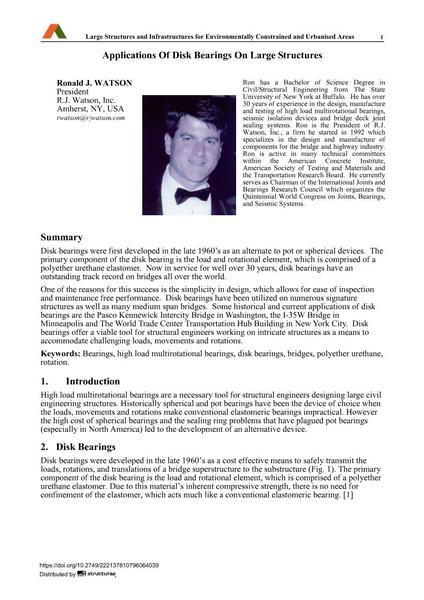Applications Of Disk Bearings On Large Structures

|
|
|||||||||||
Bibliographic Details
| Author(s): |
Ronald J. Watson
|
||||
|---|---|---|---|---|---|
| Medium: | conference paper | ||||
| Language(s): | English | ||||
| Conference: | IABSE Symposium: Large Structures and Infrastructures for Environmentally Constrained and Urbanised Areas, Venice, Italy, 22-24 September 2010 | ||||
| Published in: | IABSE Symposium Venice 2010 | ||||
|
|||||
| Page(s): | 828-829 | ||||
| Total no. of pages: | 8 | ||||
| Year: | 2010 | ||||
| DOI: | 10.2749/222137810796064039 | ||||
| Abstract: |
Disk bearings were first developed in the late 1960’s as an alternate to pot or spherical devices. The primary component of the disk bearing is the load and rotational element, which is comprised of a polyether urethane elastomer. Now in service for well over 30 years, disk bearings have an outstanding track record on bridges all over the world. One of the reasons for this success is the simplicity in design, which allows for ease of inspection and maintenance free performance. Disk bearings have been utilized on numerous signature structures as well as many medium span bridges. Some historical and current applications of disk bearings are the Pasco Kennewick Intercity Bridge in Washington, the I-35W Bridge in Minneapolis and The World Trade Center Transportation Hub Building in New York City. Disk bearings offer a viable tool for structural engineers working on intricate structures as a means to accommodate challenging loads, movements and rotations. |
||||
| Keywords: |
bridges Bearings rotation high load multirotational bearings disk bearings polyether urethane
|
||||
